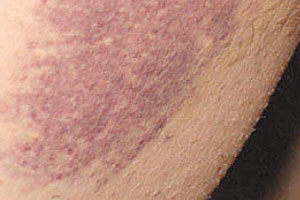Allergies
It is hypersensitivity to a specific substance that, if inhaled ingested or touched, causes sneezing, increase in lacrimation, rashes, skin irritations, swelling or itching.
This is produced because the immune system functions inadequately and attacks foreign invaders that are usually harmless in an exaggerated fashion. These substances are called allergens and the symptoms caused are called allergic responses.
When an allergen penetrates someone’s body, the immune system of this person responds by producing a great amount of antibodies called immunoglobulins E (IgE).
There are four components necessary for an allergic response to be unleashed:
– Allergens: substance that causes the allergy.
– Immunoglobulin E: antibody produced by the immune system in response to an allergen.
– Histamine: substance that is released in the allergic response and is responsible for the symptoms of the allergy (sneezing, itchiness, inflammation, among others).
– Mastocytes: specialized cells that are on the skin and in moist organs (nose, eyes and mouth) and are charged with histamine granules.
The most common allergens
Pollen: it is a tiny grain that plants release in their reproductive process. This allergy manifests with rhinitis (inflammation of the mucous membranes) and sometimes also with conjunctivitis (lacrimation and itchiness of the eyes).
– Dust mites: small arachnids that live within the house (especially within cushions and mattresses) and are responsible for respiratory allergies (like asthma).
– Foods: this type of allergy is mistaken for a profile of food intolerance, but they are different because the immune system is involved in the first one and also, the first symptoms, itchiness and swelling of the lips, usually appear a few minutes after having ingested or been in contact with the food. On the other hand, in food intolerance, said symptoms may or may not appear and if so, several hours go by.
Some of the most common foods that produce allergies are peanuts, chocolate, banana, eggs, fish and shellfish.
– Mold: this type of fungus grows in warm, dark, humid areas. When they reproduce and grow they send small spores into the air and these are the ones that are inhaled, causing allergies in some people.
– Bug bites: it is normally due to the toxic substances found in the venom of wasps and bees. It isn’t the most common allergy, but it is one of the most serious because it causes anaphylactic shock (after being stung, the toxic substances produce an allergic reaction that compromises the entire body).
– Domestic animals: substances derived from the hair and skin of some animals cause allergies.Cats are the domestic animals with the highest risk of causing allergies when they live within a house. There are also dogs, horses, rabbits and hamsters.
– Medication: ingesting pharmaceuticals (muscle relaxants, antibiotics, among others) can trigger allergic reactions in some people.
Inflammatory reaction
Inflammation is a response that needs an external agent, like bacteria, radiations, traumatisms, toxins, vascular alterations (ischemia) or immune alterations.
This reaction begins with vasodilatation (size increase in the blood vessels of the skin), with the objective of getting more blood to the affected area, also causing reddening, pain and an increase in temperature in the area.In addition, vasodilatation favors the arrival of a great amount of defensive elements, like proteins to form the blood clot and cells involved in both specific and non-specific immunity.
Inflammations can be acute or chronic. The first is suddenly triggered and presents a short swelling and pain period. The second one has a slow installation and its development lasts months or years, presenting periods of higher or lower intensity according to factors like humidity, diet or the state of the immune system.
Chronic inflammation can be produced by complications or repeated episodes of an acute inflammation or for being associated with intracellular infections (tuberculosis, leprosy, among others).








 Muere Evita
Muere Evita